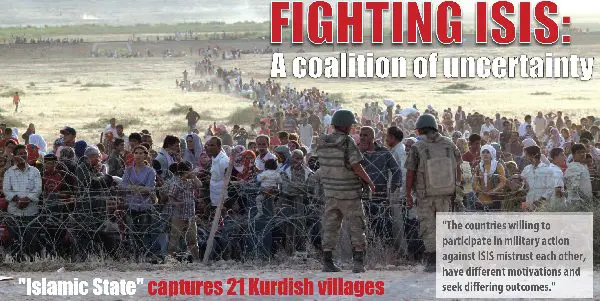
|
| Syrian militants carry a rocket before firing it towards Hama military airport that is controlled by forces loyal to Syria’s President Bashar al-Assad, in the Hama countryside July 25. |
DAMASCUS — “Islamic State” militants backed by tanks captured 16 Kurdish villages in northern Syria near the Turkish border, on Thursday, prompting civilians to flee their homes amid fears of retribution by the extremists sweeping through the area, activists said.
For more than a year, the “Islamic State” group and Kurdish militias have been locked in a fierce fight in several pockets of northern Syria where large Kurdish populations reside. The clashes are but one aspect of Syria’s broader civil war — a multilayered conflict that the U.N. says has killed more than 190,000.
“Islamic State” militants have taken over the 16 Kurdish villages in Syria’s northern Kurdish region of Kobani, also known as Ayn Arab, since Wednesday, the Britain-based Syrian Observatory for Human Rights said. It said there were casualties on both sides, but that Kurdish civilians were fleeing their villages for fear that “Islamic State” group fighters “will commit massacres against civilians.”
Nawaf Khalil, a spokesman for Syria’s powerful Kurdish Democratic Union Party, said the Kurdish fighters withdrew or lost up to 20 villages in the Kobani region and evacuated civilians with them.
“The battles that are taking place in Kobani are the most violent,” Khalil said, adding that “Islamic State” group fighters were using tanks in their offensive. Khalil called on Kurds around the world to come to Syria to defend Kobani.
Like many fronts of Syria’s civil war, momentum in the fight between the extremists and the Kurds has swung back and forth. Earlier this week, for example, Kurdish fighters captured 14 villages from the “Islamic State” in other parts of Syria. Now, the Kurds have been force out of villages elsewhere.
Still, the retreat marked a setback for the battle-hardened Kurdish force known as the People’s Protection Units. The militia, which is known by the initials YPK, has been perhaps the most successful fighting force battling the “Islamic State” group. Last month, the YPK crossed the border into Iraq and opened a safe passage for members of the ancient Yazidi minority who were attacked by “Islamic State” fighters.
The fighting around Kobani is part of the Islamic State’s wider battle in Syria as the extremists look to seize control of the few areas in the northeast still outside of their hands.
The Syrian government, meanwhile, has begun targeting the group with greater frequency since the militants overran much of northern and western Iraq.
On Thursday, government helicopter gunships attacked the northern town of al-Bab, which is controlled by the Islamic State group, killing at least a dozen people, the Local Coordination Committees activist group said. It said a helicopter dropped a barrel packed with explosives on a bakery.
The Observatory also reported the airstrike, but said at least 17 were killed. It warned that the number could rise because some of the wounded are in critical conditions.
The U.S. has been conducting airstrikes against “Islamic State” fighters in Iraq since early August. President Obama last week authorized strikes against the group in Syria as well and his administration is currently trying to cobble together an international coalition to go after the group. The U.S. is already flying reconnaissance missions over Syria.
Observatory director Rami Abdurrahman said activists saw drones flying over areas held by the Islamic State group, including the towns of Manbij and Maskaneh. He added that it is not clear whether the drones were American.
U.S. Congress approves arming Syrian rebels
The U.S. Congress gave final approval on Thursday to Obama’s plan for training and arming moderate Syrian rebels to battle “Islamic State”, a major part of his military campaign to “degrade and destroy” the militant group.
The Senate voted 78-22, in a rare bipartisan show of support for one of Obama’s high-profile initiatives. With the House of Representatives approving the legislation on Wednesday, the measure now goes to Obama to sign into law.
Ten Senate Democrats and 12 Republicans voted no.
Obama thanked Congress for the speed in which it acted to back the plan, which he announced on Sept. 10, and said the strong bipartisan support showed Americans were united in the fight against “Islamic State.”
“When you harm our citizens, when you threaten the United States, when you threaten our allies, it doesn’t divide us, it unites us,” he said at the White House after the vote.
Obama also said that more than 40 countries, including Arab states, had joined the coalition that will battle the militants, and that France would join in air strikes against “Islamic State” in Iraq.
The plan to arm and train the rebels was written as an amendment to a spending bill that would keep the U.S. government operating on Oct. 1, the start of a new fiscal year.
Some lawmakers objected to including a “war vote” in a fiscal measure.
Others worried that getting involved with the rebels would lead to broader involvement in Iraq or in Syria’s civil war or that any arms given to them might fall into the wrong hands and end up being used against U.S. forces or their allies.
Republican Senator Susan Collins of Maine voted for the spending bill, but said Congress should have engaged in a full debate over the overall plan to stop “Islamic State.”
“I’m concerned that the fighters that we train will be focused on what really motivates them, which is removing Assad, not fighting ISIS,” she said.
If Obama signs it into law as expected, the authority to train and arm the rebels would expire on Dec. 11.
AP, Reuters, TAAN






Leave a Reply